
Background Note
BACKGROUND Riga, 27 January, 2015 Informal JUSTICE and HOME AFFAIRS COUNCIL Thursday 29 and Friday 30 January in Riga The Informal Meeting of Ministers for JUSTICE and HOME AFFAIRS (JHA) will be chaired by Rihards KOZLOVSKIS, Latvian Minister for the Interior and by Dzintars RASNAČS, Latvian Minister for Justice. On Thursday, starting at 9.30 the Presidency will open the Home Affairs part of the Council meeting with the presentation on counter-terrorism followed by in-depth discussion by the Ministers for Home Affairs. The Presidency will ensure that work on the issues discussed during this informal ministerial meeting as well as on other measures discussed by the JHA Council over the last two years and those provided in other contributions from Member States, from the European Commission and from the EU Counter-Terrorism Coordinator, is taken forward at EU level in the appropriate fora and including all relevant stakeholders. The discussions will be also an input of JHA ministers to discussion at Informal Meeting of the Heads of State or Government on 12 February 2015. Over working lunch the Ministers will discuss steps to be taken to better manage migratory flows on the basis of the paper presented by the Presidency. On Thursday, starting at 15.00 the Presidency will open joint Justice and Home Affairs EU and Eastern Partnership meeting to take stock of reforms carried out in the judiciary and law enforcement area, inter alia, addressing the prevention and fight against corruption. The aim of the discussion is to put a particular focus on the achieved results, identified challenges and lessons learned. On Friday, starting at 09.00, the Presidency will open the Justice part of the meeting and will address possible further steps in justice response to terrorism. The main discussion is foreseen on the Data Protection Package, namely, regarding the delimitation of the scope of the draft General Data Protection Regulation and the draft Data Protection Directive. Furthermore, there will be a discussion on promotion of digital solutions and tools for justice. Press conferences: Home Affairs (Thursday at 12.30) EU and Eastern Partnership Justice and Home Affairs Ministerial meeting (Thursday at 18.00) Justice (Friday at 13.30) HOME AFFAIRS Counter-Terrorism The recent terrorist attacks in France have challenged core European values such as freedom of expression, pluralism, tolerance and the rule of law. As agreed in the international Ministerial meeting in Paris on 11 January, the main focus for the informal Justice and Home Affairs meeting will be counter-terrorism. The presentation by the Presidency and the following discussions will define further steps of EU action for strengthening counter-terrorism measures in the following areas: 1. Prevention of radicalization, in particular in social media; 2. Information sharing; 3. Identification of travel routes of terrorists and the need for an efficient EU PNR system 4. Use of firearms. 1. Prevention of radicalization, in particular in social media In the fight against terrorism, it is crucial to address the underlying factors of radicalization. In this regard, a comprehensive cross-sectorial approach guaranteeing the involvement of all policies, such as education, integration/social inclusion, media, detention institutions, health sector, rehabilitation, must be achieved to contribute to our common efforts in countering radicalization to terrorism. Internet is widely used for radicalization, thus fueling hatred and violence and abusing fundamental freedoms. In order to stem the use of internet for radicalization and terrorist purposes, the Ministers will discuss enhancement of the cooperation with the internet industry and social media platforms as well as strengthening Europol's role in the monitoring and analysis of social media communication on the internet. 2. Information sharing Sharing of information is a key aspect in countering terrorism. In this regard, numerous instruments of information sharing for different purposes and through different means have been developed at the EU level. However, a better use of existing instruments is required in order to maximize their potential. In the discussion the Ministers will be asked to express their opinion on the use of current databases and information systems and how they could be enhanced. Commitment of the Member States to provide Europol with relevant data and information to create a suitable information-exchange and data matching environment will also be discussed. 3. Identification of travel routes of terrorists and the need for an efficient EU PNR system Movement across borders is an obvious opportunity for law enforcement to gather information with a view to detecting suspects, disrupting networks and avoiding terrorist attacks. The need for an efficient EU PNR system has been already emphasized at the highest political level, by the European Council. All efforts must be devoted to setting-up the EU PNR system as soon as possible. UNSCR Resolution 2178 (2014), adopted under Chapter VII of the UN Charter, calls upon all Member States to cooperate in efforts to address the threat posed by foreign terrorist fighters, including by "preventing foreign terrorist fighters from crossing their borders". Significant work has already been done under the current legal framework and is being further developed to fulfil this obligation at the level of the European Union, notably through the development of common risk indicators and criteria for entering relevant alerts in the Schengen Information System (SIS). The EU and its Member States should continuously adapt their measures and capacities. The discussion will focus on whether new legislative instruments are necessary to respond to the evolution of the crime/terrorist threat, making full use of new technological possibilities. 4. Firearms Over the past years, serious efforts have been made at EU and Member States' level to curb the use of explosives for terrorist attacks. But the latest terrorist attacks and plots have shown that the use of firearms needs more attention. The Council agreed in June 2013 that trafficking of firearms should be a priority for the EU in fighting serious and organised international crime. The Commission submitted in 2013 a communication on firearms and the internal security of the EU, protecting citizens and disrupting illegal trafficking, as well as an action plan on illicit trafficking of firearms between the EU and the South EastEurope region, which was adopted by the Council in December 2014. To improve information exchange mechanisms and the collection and destruction of prohibited weapons the Ministers will discuss further strengthening of operational cooperation and the need to harmonize de-militarization of firearms, prolong traceability of firearms and better address the trade of firearms via internet. Background The EU has already a long-standing counter-terrorism strategy, developing a large scope of measures in different areas in support of Member States' counter-terrorism efforts and responsibilities. The rather recent phenomenon of foreign terrorist fighters obliges the Member States and the EU to adapt their response to this unprecedented threat by: (1) maximising the value of existing measures, building on existing tools, (2) delivering on pending proposals and initiatives such as EU PNR, data protection instrument for processing the personal data for law enforcement purposes, updated legal basis for EU agencies, etc., (3) assessing the need for taking a number of new initiatives. The Presidency notes that the declaration adopted by the Ministers of Interior present in Paris on 11 January 2015 has already been widely supported by all Member States at political and operational level. The Presidency, in close cooperation with the Member States, the Commission and the EU Counter-Terrorism Coordinator (CTC), will follow-up on the issues discussed in Riga, as well as on other measures. Contributions of the EU CTC, including the note presented to the extraordinary meeting of the Strategic Committee for Internal Security (COSI) on 20 January, as well as other contributions from the Member States and from the European Commission, will contribute to this work. Implementation will require cooperation from all. Management of Migratory Flows Over lunch, Ministers will discuss questions related to management of migratory flows. The agenda will, in particular, include a set of actions to response to human smuggling. The aim of this discussion is to assess the current situation and identify how response to the constantly evolving strategies of smugglers could be adjusted and whether there is a need to adapt the list of current measures in order to better manage the migration flows in the EU. Member States will discuss how to provide their input, expectations and views to the Commission in its preparation of the forthcoming European Agenda on Migration. Background As a response to the increased migratory pressure in the European Union the Council under the Italian Presidency adopted the Conclusions on “Taking action to better manage migratory flows” on 10 October, 2014, which built on the work done by the Task Force Mediterranean (TFM). The aim of the Council Conclusions was to respond to migratory pressure in a structural manner and going beyond the immediate emergency measures. The approach adopted by the Council is based on three pillars: a) cooperation with the third countries with a focus on fight against human smugglers and traffickers; b) strengthening of the Frontex capabilities; c) actions to fully implement the Common European Asylum system. At the time of the adoption of Council Conclusions the focus was on addressing the situation in the Mediterranean region. It was agreed that the EU actions could be adapted to the specific needs of the emerging situation. It was also agreed that the Commission would coordinate the implementation of the actions defined by the Council conclusions. Accordingly, on 4 December, 2014 the Commission presented the first scorecard on the implementation of the actions taken under the TFM and the above mentioned Council Conclusions. Since last JHA Council meeting in December 2014 some developments have emerged that might raise the need to assess if the existing instruments should be strengthened and/or complemented. Notably, the recent events involving abandoned ships Blue Sky M and The Ezadeen appear to show the emergence of a new trend (the 'ghost ships').The blatant greediness and indifference to human lives as demonstrated by smugglers cannot be left without a common European response. These recent events show that smugglers are finding new routes to facilitate the irregular entry of migrants into the EU. There are concerns expressed by some Member States that experience increased migration flows on other routes not crossing Mediterranean region. As announced in the Commission work program, the Commission will present in 2015 a comprehensive approach to address the migratory challenges that Europe faces in a European Agenda on Migration. Comprehensive means addressing all these challenges and linking more effectively the internal and external dimension. EU AND EASTERN PARTNERSHIP JUSTICE AND HOME AFFAIRS MINISTERIAL MEETING The discussion between the Eastern Partnership countries and the EU partners will focus on cooperation aimed at strengthening law enforcement and efforts aimed at strengthening the independence and accountability of judiciary and prosecutors. Both aspects will be addressed, inter alia, in light of prevention and fight against corruption. The partners will discuss the possible common ways forward in these fields taking into account the possibilities of the existing bilateral and multilateral framework of the Eastern Partnership cooperation. A comprehensive framework to prevent and fight against corruption and its result-oriented implementation is undoubtedly one of the key aspects in strengthening the law enforcement and judiciary. The Presidency intends to have an exchange of views on this matter and wishes to draw a particular attention to the efforts aimed at improving the functioning of law enforcement agencies and prosecution offices. The Presidency and the Commission are particularly keen to have an in-depth discussion on the reform of the judiciary and Prosecutor's Office in light of the most recent developments and recommendations issued by the Council of Europe's Venice Commission, in particular as regards the issues of institutional independence of the judiciary and the independence of individual judge, the independence of prosecutors, appointment and dismissal procedures of prosecutors, their accountability and the guarantees for non-interference in their work. The Presidency intends to assess the results of this discussion in view of the upcoming Eastern Partnership Summit on 21-22 May 2015 in Riga, Latvia. Background On 7-8 October 2013, under the Lithuanian Presidency of the Council of the EU, a discussion on current cooperation and future prospects in the area of justice and home affairs (JHA) was held between the Ministers of Justice and Home Affairs of the EU Member States, the Eastern Partnership countries and the European Commission. A Joint Declaration (14569/13) was adopted, inter alia, "recognising that for the benefit of both citizens and their countries, more needs to be done, in particular to strengthen the judiciary and law enforcement". The participants also reiterated "the importance of justice sector reform and efforts to prevent and fight corruption in order to strengthen the rule of law". It was also agreed to monitor progress and to give political steer to further cooperation in JHA area. In light of the Joint Declaration, it is the intention of the Latvian Presidency of the Council of the EU in close cooperation with the European Commission to organise the second EU Eastern Partnership JHA Ministerial Meeting on 29 January in Riga. JUSTICE Judicial Aspects of Terrorism The Presidency strongly condemns the recent Paris terrorist attacks and is ready to continue to work on strengthening counter-terrorism at the European level, inter alia, by exploring the judicial aspects of counter-terrorism work. The importance of the judicial aspects in fight against terrorism is fully recognised. In this regard the Presidency is assured that the reflection is needed on how to ensure maximum use of the existing legislative and non-legislative tools in the area of justice as a basis for further progress when addressing the matter, including enhancing the sharing of best practices and information. Background In the framework of the discussions during the Justice and Home Affairs Council on the foreign fighter’s phenomenon in December last year, it was agreed that further measures should be explored. The recent events have accelerated the need for further steps and therefore the agenda of Riga Informal JHA Ministerial Meeting has been amended and an item on the judicial aspects of terrorism is included for the Justice Ministerial Meeting. Data Protection The discussion will focus on the delimitation of the scope of the draft General Data Protection Regulation and the draft Data Protection Directive. Ministers are invited to indicate whether they would prefer the scope of the Directive providing for special rules applying to police and criminal justice authorities to 1) remain as proposed by the Commission, i.e., limited to the prevention, investigation, detection or prosecution of criminal offences or the execution of criminal penalties, or 2) be extended to cover 'the maintaining of law and order and the safeguarding of public security'. In the latter case, Ministers are invited to discuss as to whether the current recital explaining the notions of maintaining law and order and safeguarding of public security is sufficient or whether concrete examples need to be specified. Background In January 2012, the Commission proposed to replace the 1995 Data Protection Directive with a General Data Protection Regulation and the 2008 Data Protection Framework Decision with a Directive providing for special rules applying to police and criminal justice authorities. The discussion on how to delimit the scope between the two instruments has mainly been taking place in the context of the draft Directive. Delegations have made it clear that as long as the scope of the draft Directive was not clear there could be no progress on the other Chapters. This debate has implications for the scope of the draft Regulation because what will be covered by the draft Directive will not be covered by the draft Regulation and vice versa. Digitalisation of Justice The discussions are expected on the promotion of digital solutions and tools for justice in the areas of: 1. e-Commerce 2. e-Justice - modernisation of justice Ministers are invited to express their views on the following matters: 1) What type of possible legal framework should be put in place in order to boost online sales at the level of the European Union, in full compliance with consumer protection rules? 2) Which further measures would be necessary at the EU level to foster the ongoing work contributing to modernisation of justice in the Member States? The Presidency has foreseen an exchange of views in order to create a better understanding on how potential future EU legislation could help citizens and businesses to make more use of eCommerce in their daily purchases. Recent developments show that the EU Member States have now acknowledged at the political level the ever increasing importance, including globally, of developing and using new faster and more cost-efficient means of information exchange in the area of justice which at the same time allow easier access to justice for citizens. Background According to the European Council June 2014 strategic guidelines, a sound European justice policy will contribute to economic growth by helping businesses and consumers to benefit from a reliable business environment within the internal market. Digitalisation is therefore already present in the world of justice and will play an ever increasing role in the future. Regarding the eCommerce the EU has already adopted a number of instruments on matters relating to contracts and guarantees needed to ensure consumer protection. When adopting its strategic guidelines in June 2014, the European Council considered that further action was needed in particular on the use of technological innovations including the use of eJustice. In June 2014, the JHA Council adopted the new Multiannual European e-Justice Action Plan 2014-2018, which seeks to put into practice the strategic guidelines adopted at political level in the EU in the area of justice. The aim of the e-Justice Action Plan is to continue the modernisation of justice systems in Europe through the digitalisation of information and by mainstreaming the use of electronic means of communication in justice systems across Europe. As a follow-up, in December 2014, the JHA Council adopted the guidelines for the practical implementation of the e-Justice Action Plan for the 2014-2018 period. Media contacts: Jānis Bērziņš, Permanent Representation of the Republic of Latvia to the European Union Spokesperson Phone: +32 22 383 286 Mobile: +32 473 52 80 13 E-mail: [email protected] www.eu2015.lv Daiga Holma Communications and Media Adviser to the Minister Ministry of the Interior of the Republic of Latvia Phone: +371 29723599 E-mail: [email protected] Laura Majevska Expert in Communication Ministry of Justice of the Republic of Latvia Phone: +371 28363725 E-mail: [email protected]
© Copyright 2026
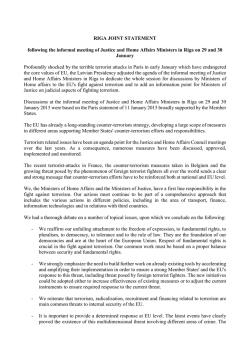
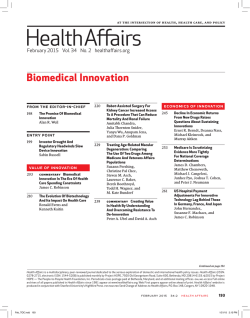
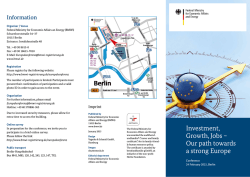
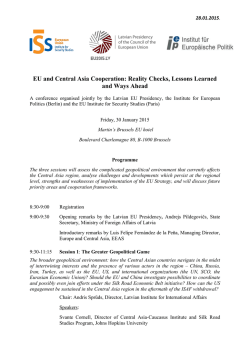
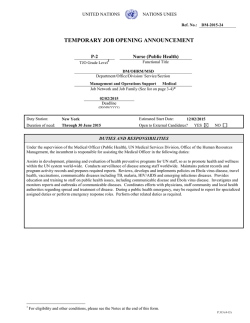
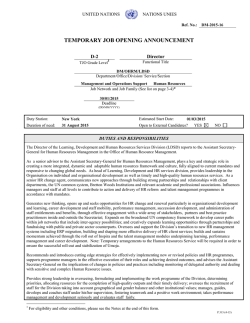


![Flyer on the event [PDF]](http://s2.esdocs.com/store/data/000461133_1-4d88ad04a2122eb11dffd05a58c0a0a8-250x500.png)